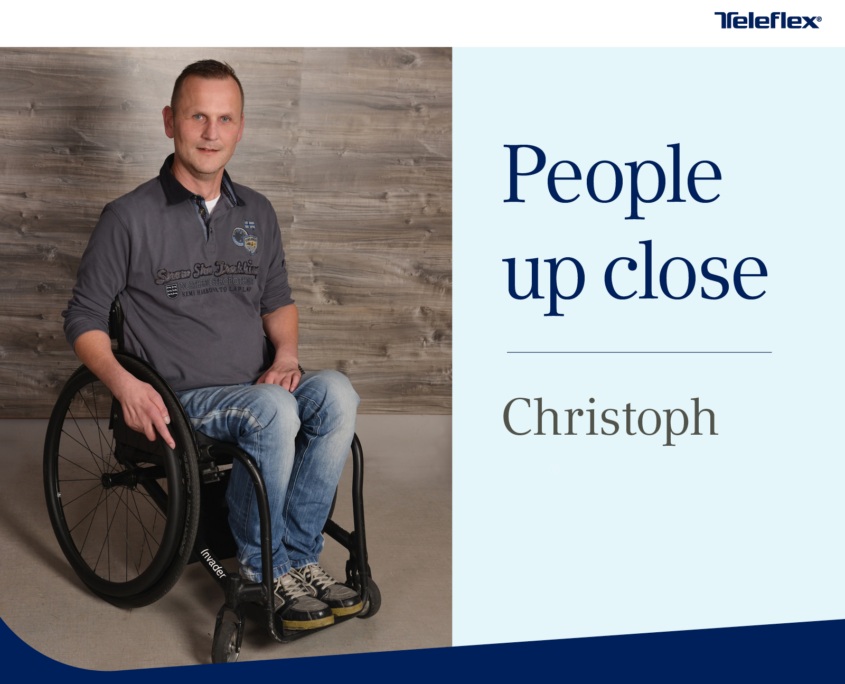Teleflex for active living: people up close – Christoph
Improving the quality and health of people´s lives is the crucial topic of our Teleflex Urology Care business unit. For many years, Teleflex Urology Care has pursued its “Teleflex for active living” initiative with events and sponsorship activities that we support and where we interact with users of our products. With the new series “Teleflex for active living: people up close”, we want to introduce you to some impressive people from different countries. Today we talk with Christoph from Germany.
The 54-year-old Christoph became a wheelchair user himself in 1989 following a car accident. He has been playing wheelchair rugby successfully since 1998. He became German champion several times and also participated in European and World Championships as well as the Paralympic Games. In 2014, he switched to the coaching bench and has been head coach of the German wheelchair rugby national team since then.
As an active athlete and current coach, he knows particularly well how important it is to be able to actively participate in life. His personal experiences flow into his daily work.
What does your everyday life look like, both professionally and privately? What is your touchpoint to the topic intermittent catheterisation?
My daily routine is very individual. As I myself am paraplegic due to a car accident in 1989 and therefore also have bladder and rectum paralysis, the first and last thing I do every day is intermittent catheterisation. I have to catheterise 5-6 times a day. I usually get up at 7 a.m. during the week. Either I have to go to the toilet, or I do standing exercises and watch the news. Then between 8 a.m. and 8:30 a.m., I have a smoothie for breakfast. From 9 a.m. on, work begins. This always varies: office work, organization (for the national team), customer visits and video analysis. I usually finish work around 6 p.m., but it can sometimes be later due to individual consulting appointments. Since my work and hobbies (wheelchair rugby and handbiking) are very closely linked, I rarely look at the clock. On days when I’m at home, I like to take a half-hour power nap at lunchtime. If there’s time, I do a little strength training in the early evening. However, by 8 p.m. at the latest, I lie on the sofa and watch a show on TV.
The weekends are different. When we have competitive training or tournaments with the national team, the focus is only on working with the team from 7 a.m. to 9 p.m. most of the time, but of course there are always breaks in between. On free weekends, I enjoy the peace and quiet at home and sleeping in… If the weather is nice, I also like to go on a bike tour through the Westerwald.
Let’s have a closer look on you: What is your story for us to share today with our readers? Please let us know about the path you have taken and what makes it special? Which extraordinary moments did you have?
I think I could write a book on this subject, but I’m too lazy to write (laughs). When I was 20, I had a car accident that was my own fault – youthful recklessness. However, my life changed completely as a result, but that’s probably the way it is for every paraplegic. Until 1997, my life as a wheelchair user was rather boring! Monday to Friday working in my father’s company, weekends maybe sometimes on the soccer field. But then I broke my leg in March 1997 and was hospitalized in the Werner-Wicker-Klinik. There I was approached relatively quickly by wheelchair rugby players, asking me if I didn’t want to give it a try… When everything had healed in the summer, I went to Bad Wildungen for training, and that was the day my life changed for a second time. I immediately fell in love with the sport! I was suddenly “fast” with the chair, I was “agile” – simply awesome. From then on, I drove the 100 km to Bad Wildungen every week to train. In 2002, I made it onto the national team, where I played until September 2008. I became German Champion four times, once with Bad Wildungen and three times with Koblenz. With the national team, I was twice European vice champion and took part in the World Championships and Paralympics twice.
After that, I became the team manager of the Polish national team in 2009, which I then coached from 2010-2014 before becoming the German national coach in October 2014, which I still am… When you start, you meet new people, then the first tournament, you meet more new people and so on. The circle of friends and acquaintances gets bigger and bigger and everywhere you go you learn something new, whether at home, in training or during the many trips around the world.
The two Paralympics were definitely extraordinary. I still get goose bumps when I think about the opening ceremonies. The same is true of my first World Championship as a coach, where we surprisingly achieved 8th place with Poland. But there have also been setbacks, like the European Championships in 2013, when we arrived with Poland as medal aspirants and only finished 9th in the end, or the missed qualification for the World Championships in 2018 with Germany.
What is the biggest challenge for you in everyday life, and what is the greatest opportunity? How do you get motivated or inspire others?
The biggest challenge in my daily life is my “bowel”! A topic that everyone is reluctant to talk about, but which is part of almost every paraplegia. For over 25 years, I had my bowel under control in my daily life and I was in charge of my own life. Since 2015, it unfortunately happens again and again that I have to let my bowel be in charge, which makes you approach life planning or travel planning more cautiously! And I love traveling and still have many goals in mind.
I am motivated by daily life, how beautiful it is with its ups and downs, but also by being successful professionally. And with the national team, it’s just great to see how the young players develop and how the older players are still fully motivated to achieve their goals and, despite all the negative things (training after work, little free time, no earnings, few young players and little match action due to Corona), they get up to train almost every day. And how the squad cheers me up, even if a tournament or match hasn’t gone the way I wanted…
If we look back, what are you most proud of for what you’ve done? And why?
Professionally, I am most proud of the fact that I started my own business in 2006 and have built up a small successful company. I’m also proud of the fact that I work with large companies – even global ones – and that they respect me as a good customer.
In sports, it’s more difficult. Of course, I’m proud of my own sporting successes, which you never forget, but I’m also proud of having achieved so much as a trainer and always motivating athletes to follow the path of wheelchair sport, even if it’s a different sport.
You use intermittent single-use catheters to empty your bladder – which product do you use and why?
I use a non-contact hydrophilic disposable catheter as a complete system. I like to use this catheter very much because I do not come into direct contact with the catheter thanks to the “non-touch” handling and thus rarely have bladder infections. In addition, the catheter glides very well and the integrated collection bag eliminates the need for annoying adaptation of urine collection bags, which is extremely difficult for tetraplegics.
What would be your wishes for the future? In general, but also in particular regarding the topic of intermittent catheterisation?
What are my wishes? That I remain “as independent as possible” for as long as possible, fit and healthy, so that I can still do my work and, above all, travel the world for a long time. Of course, I’d love to see a medical miracle for bowel emptying for paraplegics and an almost perfect disposable catheter with much less waste.
Do you have tips for everyday life, work, travel and leisure in terms of intermittent catheterisation?
I think you have to work out the tips for yourself! The important thing is not to let it determine your life. There are always corners and places where you can catheterise without being disturbed. You don’t have to be guided by “wheelchair accessible” toilets when planning your route or vacation. Because then you have to forego many beautiful places. Very important, of course, is to always pack a few days’ worth of extra catheters! Everything else you can buy somewhere.
Your personal closing word for our readers?
It is important that no one allow their disability or problems to determine their life. Here, medicine and industry have helped us a lot in recent years, be it in the further development of intermittent catheters or wheelchairs or other aids. As a wheelchair user, you have problems like everyone else, here it is important to work on solutions and not to let it get you down… Life is too good to complain, even if it sometimes has to be difficult.
Christoph, many thanks for these interesting insights, and all the best for the future.
Image source: private



